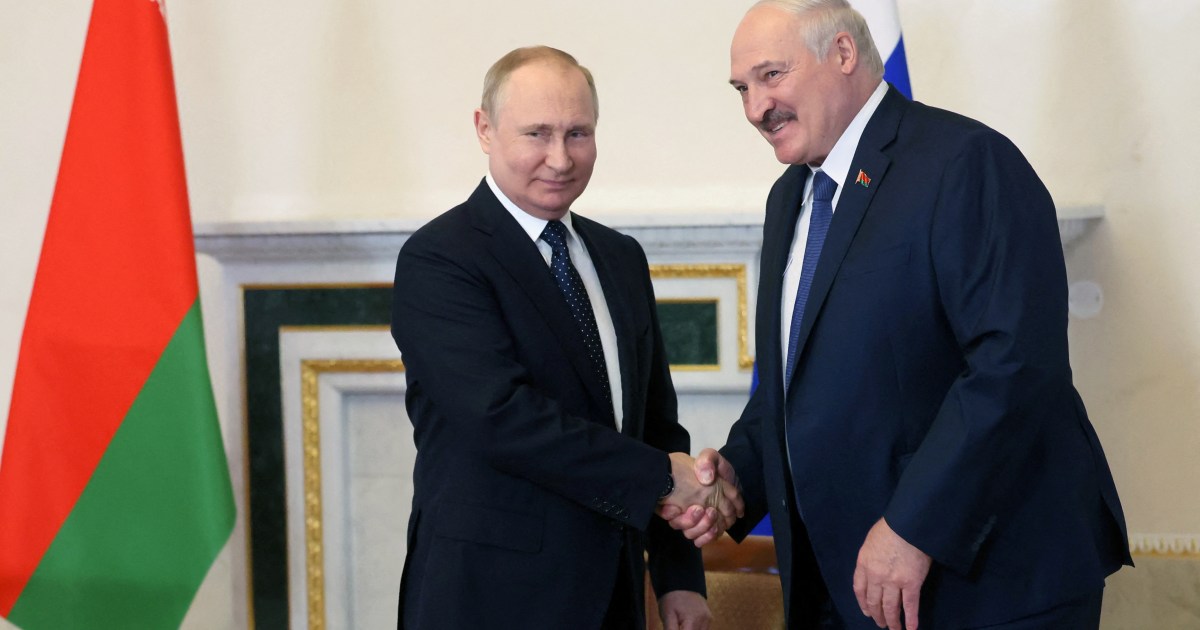Will Western pressure trigger Russia’s ‘merger’ with Belarus?
Kyiv, Ukraine – Earlier this month, Russian President Vladimir Putin made it sound as though Western nations were to thank for making his decades-old dream to merge Russia with neighbouring Belarus come true.
“Unprecedented political and sanctions pressure from the so-called collective West pushes us to speed up the merging processes,” Vladimir Putin said on July 1 at a forum in the western Belarusian city of Grodno, a stone’s throw away from the European Union’s border.
“Because together, it will be easier to minimise the damage from the illegal sanctions” imposed on Russia and Belarus by the West, Putin said.
A week earlier, his Belarusian counterpart Alexander Lukashenko urged leaders of other ex-Soviet nations to get closer to the “union state” of Russia and Belarus – or face the loss of their independence.
“Today, the nations of post-Soviet space must be sincerely interested in their rapprochement with the union state – if, of course, they want to keep their sovereignty and independence,” he said in a video address.
“Those who hesitate have to understand – without the promptest unification and rapprochement, stronger inter-state ties and just simple human relations, tomorrow we might not be any more,” said Lukashenko, who has ruled Belarus since 1994 and whose re-elections have increasingly been marred by violence against his rivals and protesters.
In the late 1990s, Lukashenko was eager to merge his ex-Soviet nation of 9.2 million with Russia – and signed a deal to create a “union state” with a common constitution and parliament.
The former collective farm manager, nicknamed “Bat’ka” (Daddy), hoped to succeed the heavy-drinking Russian President Boris Yeltsin whose mental and physical state was rapidly deteriorating.
Yeltsin, however, anointed Putin, a teetotal intelligence chief, as his successor in 1999, and Lukashenko hit the brakes on the merger.
But he kept milking the Kremlin, getting multibillion-rouble loans, discounted natural gas, trade preferences and perks for Belarusian labour migrants.
Russia’s backing helped Lukashenko, who has long been dubbed “Europe’s last dictator”, to keep his head above water politically and economically, especially when the West sanctioned Minsk for its intensified crackdown on opposition and critics.
Lukashenko also kept looking for leeway.
He sought to wean his economy off the profits from state-run collective farms, chemical plants and a giant oil refinery that used cheap Russian crude.
Defying his image of a former Communist official with a Chevron moustache and a strong rural accent, he created the Belarus Hi-Tech Park, a Belarusian “Silicon Valley” where tens of thousands of IT engineers developed impressive software and startups.
But the IT sector shrank after the boiling point in 2020, when hundreds of thousands of Belarusians took to the streets to protest against his sixth re-election.
They clashed with police and held strikes – but Lukashenko’s law enforcement agencies responded with violence, torture, arrests and prison sentences.
Tens of thousands left Belarus, including many IT experts, mostly for neighbouring Poland, Lithuania and Ukraine.
Lukashenko appeared cornered, and Moscow remained his only backer – while the Kremlin kept pushing him to finalise the merger.
Russian officials remembered too well how Putin’s approval ratings rose to a stratospheric 88 percent after Moscow’s previous “acquisition” – the 2014 annexation of Crimea from Ukraine.
The USSR revived?
To some observers, the merger is a done deal; they view it as part of Moscow’s plans to announce the revival of the truncated replica of the Soviet Union this December.
“The matter has been solved in the light of the USSR’s centennial anniversary in December 2022 and Putin’s plans to create a ‘third empire’ that would [succeed czarist Russia and the USSR and] include Belarus,” Kyiv-based analyst Aleksey Kushch said.
“What’s happening now is simply a technological step to get the public opinion ready for this act,” he told Al Jazeera.
But other analysts say Lukashenko is still trying to push back.
“Lukashenko is badly cornered, but seems to be resisting the final solution,” Pavel Luzin, a Russia-based analyst with the Jamestown Foundation, a think-tank in Washington, DC, told Al Jazeera.
While Putin’s statements about the merger are a chance to boost his approval ratings in Russia, Lukashenko’s words about the union state are nothing but an “alarm signal” to the West, a Belarusian-born observer said.
“Lukashenko’s words are more of an alarm signal for [other] nations, mostly in the EU – you are pushing us closer to Russia,” Igar Tyshkevich, who is based in Kyiv, told Al Jazeera.
And when it comes to the Belarusian public, unification is far from popular.
In July 2021, the number of Belarusians who staunchly backed it rose to nine percent from five in 2020, according to the latest independent survey on the matter conducted by the Chatham House, a British think-tank.
Eleven percent of those polled wanted Belarus and Russia to have a “single market with single foreign policy and army,” and about a third stood for a “single market” and a “free trade zone,” according to the poll.
“With moods like these, it’s hard to conduct a merger,” Tyshkevich said.
Even if state-backed Belarusian media outlets were to support the idea, this would hardly change the public’s mood as only a quarter of Belarusians rely on these channels, he said.
“No matter how harsh your propaganda is, if 75 percent of the population doesn’t watch it, you have no mechanisms to influence these people’s opinion, even if your propaganda is genius,” Tyshkevich said.




